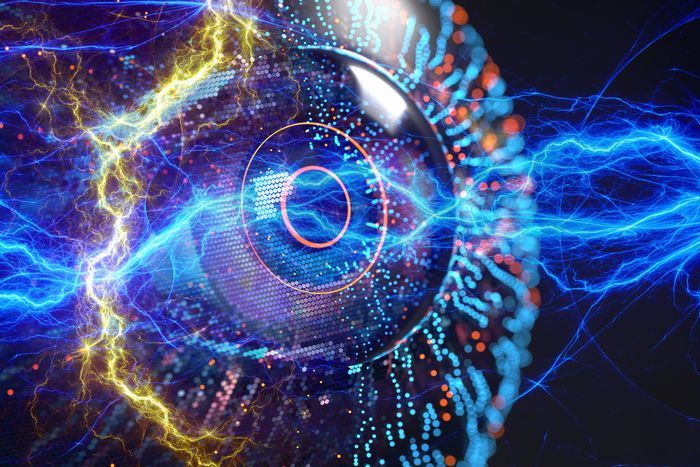The Ultimate Supercomputer
The Ultimate Supercomputer: Unlocking the Potential of the Human Brain 🧠💡
Hey there, tech enthusiasts and future innovators! Bernard here, and today we're diving deep into the most advanced piece of technology known to humankind – the human brain. 🚀As we push the boundaries of artificial intelligence and machine learning, it's crucial to remember that we're all walking around with the most sophisticated computer ever created right inside our skulls. Let's explore why the human brain is the pinnacle of natural engineering and how we can harness its incredible power to shape the future of technology.The Brain by the Numbers: Staggering Statistics 🔢
Before we delve into the intricacies of brain function, let's take a moment to appreciate some mind-blowing statistics about this remarkable organ:- Neuron count: The human brain contains approximately 86 billion neurons. That's more than 10 times the number of stars in the Milky Way galaxy!
- Synaptic connections: Each neuron can form up to 10,000 synaptic connections with other neurons, resulting in a staggering 100 trillion connections in total.
- Processing speed: Neurons can transmit information at speeds of up to 268 mph (431 km/h). This allows for near-instantaneous reactions and complex thought processes.
- Energy efficiency: The brain consumes only about 20 watts of power – that's less than a typical LED light bulb!
- Storage capacity: While difficult to quantify precisely, some estimates suggest the human brain can store up to 2.5 petabytes of information. That's equivalent to about 3 million hours of TV shows!
The Brain vs. AI: A David and Goliath Story 🤖
As someone deeply involved in the development of artificial intelligence, I can confidently say that even our most advanced AI systems pale in comparison to the human brain. Here's why:- Adaptability: The human brain can learn and adapt to new situations with incredible speed and flexibility. While AI can be trained to perform specific tasks exceptionally well, it struggles with generalization and adapting to novel scenarios.
- Creativity: The ability to generate truly original ideas, make unexpected connections, and think "outside the box" remains a uniquely human trait. AI can simulate creativity to some extent, but it's still based on existing data and patterns.
- Emotional intelligence: Our brains are hardwired for empathy, social interaction, and emotional understanding. These qualities are essential for effective communication and decision-making in complex social environments – something AI is still far from mastering.
- Energy efficiency: As mentioned earlier, the brain operates on just 20 watts of power. In contrast, training a single large AI model can consume millions of watts and produce significant carbon emissions.
- Multitasking: While computers excel at parallel processing for specific tasks, the human brain can effortlessly juggle multiple complex cognitive processes simultaneously – from regulating bodily functions to solving abstract problems and engaging in creative pursuits.
Unlocking the Brain's Potential: Neuroplasticity and Lifelong Learning 🔓
One of the most exciting aspects of the human brain is its neuroplasticity – the ability to form new neural connections and reorganize existing ones throughout our lives. This remarkable feature allows us to:- Learn new skills at any age
- Recover from brain injuries
- Adapt to changing environments
- Enhance cognitive abilities through targeted training
The Quantum Brain: Exploring the Frontiers of Neuroscience 🌌
Recent research in quantum biology has opened up exciting new possibilities for understanding the brain's incredible capabilities. Some scientists propose that quantum effects may play a role in neural processing, potentially explaining phenomena like consciousness and intuition.While still highly speculative, the idea of quantum computing in the brain could help explain:- The brain's massive parallel processing capabilities
- Our ability to make intuitive leaps and solve complex problems instantaneously
- The subjective experience of consciousness
Enhancing Brain Function: Nootropics, Neurofeedback, and Beyond 💊
Given the brain's incredible potential, it's no surprise that there's growing interest in cognitive enhancement technologies. Some promising areas of research include:- Nootropics: Also known as "smart drugs," these substances aim to improve cognitive function, memory, and creativity. While the efficacy of many nootropics is still debated, compounds like caffeine and L-theanine have shown promising results in enhancing focus and alertness.
- Neurofeedback: This technique involves real-time monitoring of brain activity, allowing individuals to learn how to regulate their own neural patterns. Neurofeedback has shown potential in treating conditions like ADHD and anxiety, as well as improving peak performance in healthy individuals.
- Transcranial magnetic stimulation (TMS): By using magnetic fields to stimulate specific areas of the brain, TMS has shown promise in treating depression and enhancing cognitive abilities like working memory and attention.
- Brain-computer interfaces (BCIs): These devices allow direct communication between the brain and external devices. While still in their infancy, BCIs have the potential to revolutionize how we interact with technology and even augment our cognitive capabilities.
- Meditation and mindfulness: Ancient practices like meditation have been scientifically proven to enhance brain function, reduce stress, and improve overall well-being. The best part? They're free and accessible to everyone!
The Ethics of Brain Enhancement: Navigating the Future 🧭
As we explore ways to enhance and augment our cognitive abilities, it's crucial to consider the ethical implications of these technologies. Some key questions we need to address include:- Equity and access: How do we ensure that cognitive enhancement technologies don't exacerbate existing social inequalities?
- Safety and long-term effects: What are the potential risks and unintended consequences of brain enhancement techniques?
- Cognitive liberty: To what extent should individuals have the right to modify their own brain function?
- Human identity: How might widespread cognitive enhancement change our understanding of what it means to be human?
- Societal impact: How would a world of enhanced cognition affect our social structures, economies, and global dynamics?
Harnessing the Power of Your Brain: Practical Tips for Cognitive Optimization 🏋️♂️
While we wait for advanced brain enhancement technologies to mature, there's plenty we can do right now to optimize our cognitive function:- Prioritize sleep: Quality sleep is essential for memory consolidation, creativity, and overall brain health. Aim for 7-9 hours per night.
- Exercise regularly: Physical activity increases blood flow to the brain, promotes neuroplasticity, and reduces the risk of cognitive decline.
- Maintain a healthy diet: Foods rich in omega-3 fatty acids, antioxidants, and vitamins support brain health. Consider incorporating foods like blueberries, nuts, fatty fish, and leafy greens into your diet.
- Challenge your brain: Engage in activities that push your cognitive limits, such as learning a new language, solving puzzles, or picking up a musical instrument.
- Practice mindfulness: Regular meditation or mindfulness exercises can improve focus, reduce stress, and enhance overall cognitive function.
- Stay socially active: Engaging in social interactions and maintaining strong relationships can help keep your brain sharp and reduce the risk of cognitive decline.
- Manage stress: Chronic stress can have detrimental effects on brain health. Find effective stress management techniques that work for you, such as exercise, meditation, or hobbies.
- Stay curious: Cultivate a lifelong love of learning. Explore new subjects, read widely, and never stop asking questions.
The Future of Brain Research: What's Next? 🔮
As we continue to unlock the secrets of the human brain, several exciting areas of research are poised to revolutionize our understanding of cognition and potentially lead to groundbreaking technologies:- Mapping the connectome: Efforts to create a complete map of neural connections in the brain could provide unprecedented insights into how information is processed and stored.
- Artificial neural networks: By mimicking the structure and function of biological brains, we may be able to create more efficient and capable AI systems.
- Neuroprosthetics: Advanced brain-computer interfaces could restore function to individuals with neurological disorders and potentially enhance cognitive abilities in healthy individuals.
- Personalized medicine for brain health: Advances in genetics and neuroimaging may allow for tailored treatments and interventions to optimize individual brain function.
- Consciousness research: As we delve deeper into the nature of consciousness, we may uncover fundamental truths about the relationship between mind and matter.
Conclusion: Embracing Our Cognitive Potential 🌟
The human brain is, without a doubt, the most remarkable piece of technology we've ever encountered. Its complexity, efficiency, and adaptability continue to astound scientists and push the boundaries of our understanding.As we forge ahead into an increasingly technological future, it's crucial that we don't lose sight of the incredible potential residing within our own minds. By nurturing our cognitive abilities, embracing lifelong learning, and pushing the frontiers of neuroscience, we can unlock new levels of innovation, creativity, and problem-solving that will shape the world for generations to come.Remember, the next world-changing idea could be brewing in your brain right now. So take care of that magnificent organ, challenge it regularly, and never stop exploring the limitless possibilities of human cognition.Want to learn more about optimizing your brain's performance and staying ahead of the curve in our rapidly evolving technological landscape?Let's harness the power of our minds to create a brighter, more innovative future for all of humanity. The journey of discovery starts with a single thought – what will yours be?
Categories
- All Blogs (184)
- #FearlessFriday (10)
- #MotivationalMonday (14)
- #solutionsaturday (6)
- #SoulfulSunday (7)
- #TechnologyThursday (10)
- #WellnessWednesday (14)
- 10 Steps To Know About Buying A Home In Poinciana (1)
- 10 Things To Know About Davenport (1)
- 10 Things To Know About Poinciana (1)
- 5 New Things For Poinciana For 2025 (1)
- Annual Events and Festivals in Kissimmee, Fl (2)
- Benefits of Living in Poinciana (1)
- Benefits of Selling to a Cash Buyer (1)
- Buyers (73)
- City Guides Kissimmee (4)
- CITY GUIDES: Poinciana Real Estate News & Resources (3)
- CITY STATISTICS: Davenport Real Estate News & Resources (1)
- City Statistics: Kissimmee (2)
- CITY STATISTICS: Lake Wales Real Estate News & Resources (1)
- Kissimmee Homes For Rent (4)
- Kissimmee Homes For Sale (9)
- Pros and Cons of Living in Kissimmee, FL (1)
- Renters (37)
- Retirement In Poinciana, FL (1)
- Sellers (16)
- Things To Do In Poinciana (2)
- Things To Do Near Kissimmee, FL (2)
- Things To Do NYE 2025 In Orlando and Kissimmee, FL (1)
- Truth About 20 Percent Down (1)
- What Are The Benefits of Living In Kissimmee (1)
- Your Dream House (1)
Recent Posts

Poinciana & Kissimmee Rentals | Week of 2025-10-10

Why a Conventional Mortgage Can Put You Ahead in Central Florida

Poinciana FL Rental Homes vs Buying in 2025 | Bernard Jackson Realtor

Rent vs Buy vs Sell in Central Florida 2025 | Bernard Jackson Realtor®

New Construction Homes in Polk County, FL (2025 Guide)

Homes Not Yet on Zillow | Central Florida Off-Market Listings

Kissimmee vs Orlando Home Prices in 2025 | Where Smart Buyers Get More

Kissimmee Luxury Homes — Why Own Here + 5 New Listings

Lake Wales, FL Homes Market Summary — August 2025 (with ZIP Snapshots)

Davenport, FL Homes Market Summary — August 2025 (with ZIP Snapshots)
GET MORE INFORMATION



